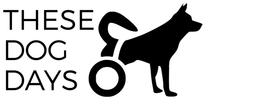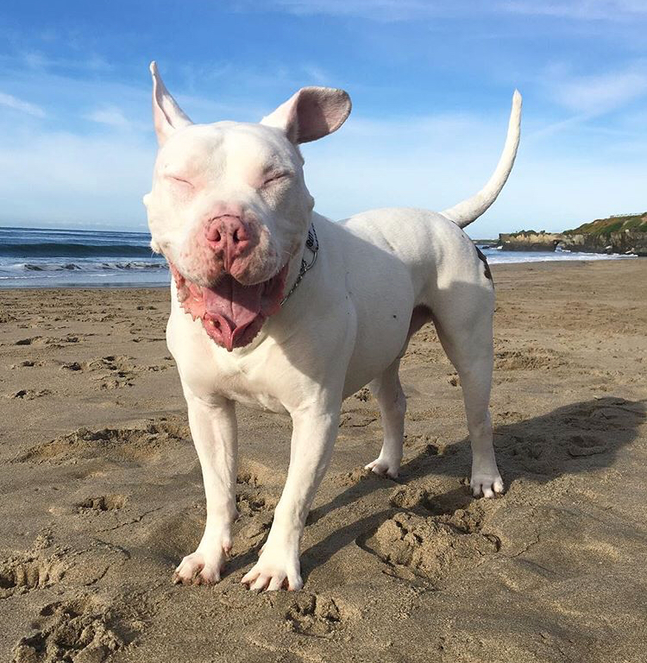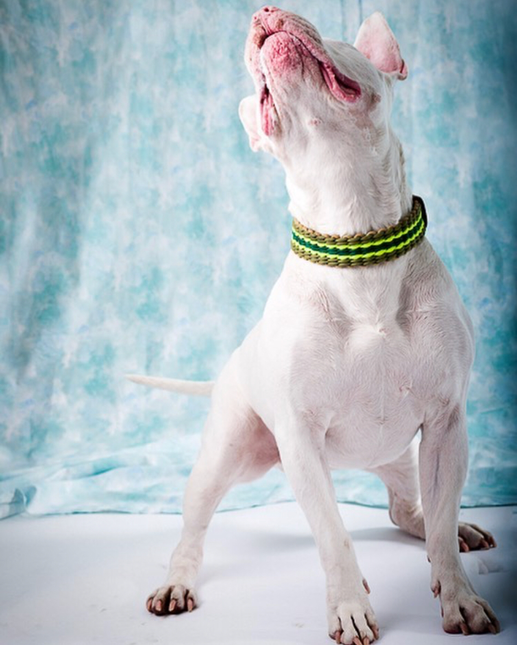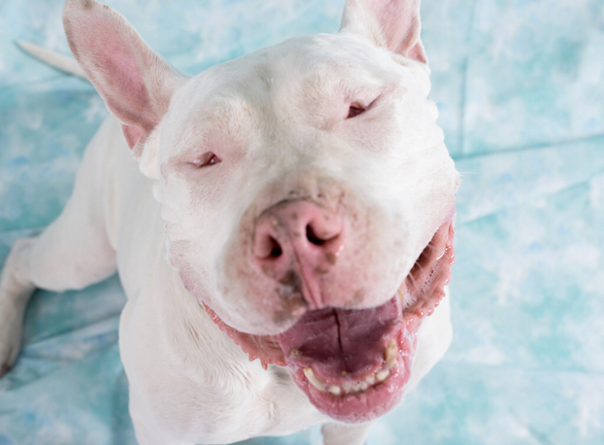|
Today we talk to Paige from Santa Cruz, CA about life with her pit bull cross, Steve. Steve was born both blind and deaf. His life could have taken two routes - he could have been aggressive, scared, and unpredictable (I would be terrified of everything if I couldn't see or hear it approaching!) or he could have been a confident, happy dog who didn't let his disabilities get in the way of enjoying life. He chose the latter. As far as I'm concerned, Steve doesn't have any disabilities - he is a normal dog that likes to eat, sleep, play, go on walks, and snuggle (ALL the snuggles). What does a regular day with blind and deaf dog look like?I am a full time student with about a million other extracurricular activities including internships, lab work, etc. I schedule my classes and activities around how long I know Steve can be alone, which is usually about 4 hours, but I need to feel confident that Steve is "set up" for the day. We live in an apartment where Steve doesn't have access to a yard when he's home alone, so to prevent any potty accidents (which haven't happened in years) and to prevent any unwanted barking or mischievousness when Steve gets bored, we've implemented a pretty simple, yet specific, morning schedule. We wake up at 5am and have breakfast and go on the first potty walk of the day. Steve goes back to sleep until about 7am. Between 7am and 8:30am, we'll take one or two more potty walks to make sure there won't be any accidents (its really easy to tell when Steve has to poop: he gets the zoomies, and then sneezes twice. That's the signal that its time for another potty walk). These potty walks also tire him out a little, which is helpful. This schedule is not only to reassure me, but to make him comfortable to for the few hours he's alone. We make sure all bedroom and bathroom doors are closed before we leave the house to make sure Steve doesn't go through the trash or tear the toilet paper off the handle (his FAVORITE mischievous pastime). I come home for lunch at about 1pm and give Steve his midday snack. We take another potty walk. When either I or my partner, aka Steve's dad, gets off work/out of school, Steve gets dinner (roughly 5pm). Then, we go on a longer evening walk, which Steve really enjoys. He loves to sniff around the neighborhood and strut his stuff. He takes another potty walk or two around our apartment complex before his bedtime, which is usually around 9pm (he will take himself to bed... no coaxing necessary). It seems like all we do with Steve is take him on potty walks, but in between all of his scheduled breaks, he gets so much attention and stimulation with snuggles, scratches, toys, etc. Not to mention, he simply loves his walks and looks forward to all of his daily action! Although Steve does enjoy his weekday walk and snuggle routine, we try to get out and do as many activities as we can with him over the weekends. His favorite thing to do is go to an off-leash dog beach, because he likes to feel free. He runs up and down the beach without a care in the world, and you can see the joy in his eyes. Steve still acts like a puppy, but as he gets older, we can see that the amount of activity he can handle is decreasing, so we don't push it with him. If he wants to spend a day catching up on rest and relaxation, he is more than welcome to do so (although he'll NEVER say no to a car ride to the beach) What advice would you offer to someone with a blind and deaf dog?We have found that there isn't an easy way to say "no" to a dog that can't see or hear. We use positive reinforcement to train him, and try to redirect his attention when he's being bad (he is quite the nosey little dude! and gets into places/things that he shouldn't). Be patient!! Dogs with disabilities are NOT as difficult as people might think, and I absolutely recommend adopting a dog with special needs. But patience is so, so, so necessary. There are times where I get frustrated with Steve because he can't understand anything besides what his nose tells him to do, but at the end of the day I have to remember that his nose is all he can rely on. The amount of patience given is received a thousand times over with the amount of love these animals give back. Thanks to @bad_dog_steve for taking the time to share your story.
Check out these products that have been recommended for deaf and blind dogs
1 Comment
|
Search or select topicsAll Acupuncture Arthritis Bladder Management Blindness Bowel Management Cerebellar Hypoplasia Deaf Degenerative Myelopathy Diabetes Diet Electro Stimulation FCE Genetic Disorder Grooming Hemivertebrae Hydrotherapy Incontinence IVDD Laser Therapy Limb Amputation Limb Deformity Paralysis Physical Therapy Rescue Spinal Injury |
Search by typing & pressing enter



